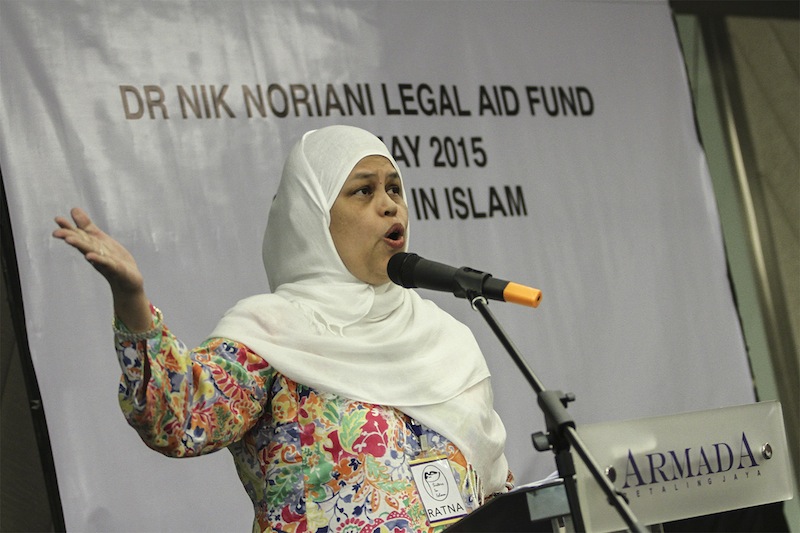KUALA LUMPUR, May 23 ― Aida Melly Tan Mutalib spent eight years in an arranged marriage until, in 1996, she decided to divorce her abusive husband who had taken a second wife. She was then 29.
It took her nearly eight more years before she finally got her divorce ― years spent going in and out of courts due to the tortuous bureaucracy in the Shariah court, which women’s group said continues to be hostile towards Muslim women.
Aida Melly’s case has served as the watershed moment for the Muslim women’s rights movement, but almost 20 years on, single mothers and activists told Malay Mail Online little has changed with the Islamic legal system.
Stonewalled by Shariah courts
“I’ve experienced going in and out of courts a long time ago. Sometimes these court, whenever we came to the court, the judge was suddenly on leave.
“They should inform us before we come to the court. It’s a waste of time,” said an older single mother named Mariam Abdul in a recent interview.
Mariam, popularly known as Kak Yam, was instrumental in coordinating the formation of the first support groups for single mothers in every state back in the 1990s, through her role in charity group Pertubuhan Tindakan Wanita Islam (Pertiwi).
Through almost two decades of aiding single mothers, Kak Yam said she had counselled many frustrated and furious Muslim women who were allegedly stonewalled by the Shariah courts in their divorce cases.
“It is very sad for them, the single mothers. We have stigma [against] single mothers; until now we have that stigma,” said Kak Yam, as she recalled the case of Aida Melly.

Kak Yam related an incident where Aida’s husband was already in the court’s canteen, but the court had cancelled the hearing because of his absence, and refused to call the husband over to the courtroom.
“For us single mothers, there were just too many forms to be filled. Even when we have submitted them, they would not be enough,” said single mother Latifah Ab Rahman, 55.
“Sometimes we have to open new files, it was very confusing … I had to skip work just to reopen my case, but when I arrived there, my files were already gone!”
Reform of Family Law
The case of Aida Melly eventually led to the formation of rights group Sisters In Islam (SIS), which until now is still pushing for the reform of Shariah laws involving women, especially the amended Islamic Family Law (Federal Territories) Act 1984.
“[The Act] was very good, and it became a model Muslim family law,” SIS executive director Ratna Osman told Malay Mail Online.
However, Ratna said the law was then amended several times over the years, with the latest in 2006, and became increasingly regressive and biased against women.
“In classical jurisprudence, fasakh has always been the right of women according to the majority of scholars. But in 2005 it has been allowed for men in Malaysia,” said Ratna, referring to the process of seeking divorce.
There are three types of divorce is Islam: talaq, where a husband initiates a divorce with a proclamation; fasakh, where a wife seeks divorce by petitioning a court; and li’an, where a husband accuses the wife of adultery.
“The implication is that upon divorce, men do not need to give nafkah (alimony) to the wife … And the most dangerous, the wife may lose the chance of getting child custody,” Ratna said, referring to men opting for fasakh instead of talaq.
Among those at the forefront of the drive for reforms was the late Dr Nik Noriani Nik Badli Shah, an influential Islamic legal academic and SIS legal adviser, who had been elected into the Shariah Technical Committee to reform the Shariah legal system in 2005.
The proposed reform was accepted by the authorities, but in 2009 was pulled back just before it was due to be tabled in Parliament, allegedly because the Attorney-General’s Chambers (AGC) did not first consult the Conference of Rulers.
That spelled the end of the reform proposal.
‘Money is number one’
The biggest challenge most Muslim women divorcees face involve money, especially with protracted legal case to demand the alimony that is obliged on the ex-husband, and to receive their share of matrimonial property.
“Too many of the single women we help work on a daily wage basis. For each day that they have to go to the court, they don’t have wage for that day. They are not paid for that day,” said Zainah Anwar, one of the founders of SIS.
Zainah said other costs borne by women seeking divorce include covering their transport and childcare for every court appearance.

SIS estimated that at least RM250 is needed just to file a case in court, and should the case gets heard, a Shariah lawyer would cost anywhere from RM5,000 to RM15,000 per case.
“For single mothers, our main problem is our economy. Money is number one. Anybody can shed tears. But when you have the money, you will no longer shed any tear,” said Latifah, who sought divorce when she was 36.
The mother of two from Muar, Johor said she was an unemployed housewife when she was divorced, and had opened a food stall with what little saving she had to keep feeding her children.
She is now an entrepreneur with two businesses to her name. “If my ex-husband gives any money now, I would not even want it,” she said, laughing.
To alleviate the financial burden of Muslim women seeking justice in the Shariah court, SIS launched this week a Legal Aid Fund named after the aforementioned Nik Noriani.
The fund is an extension of SIS’ Telenisa legal advisory service, which had handled 729 cases last year alone, of which 148 were on divorce.
The Dr Nik Noriani Legal Aid Fund has so far gathered nearly RM130,000 from the late academic’s personal estate and SIS’ previous collection, and is aiming to collect at least RM500,000.



















